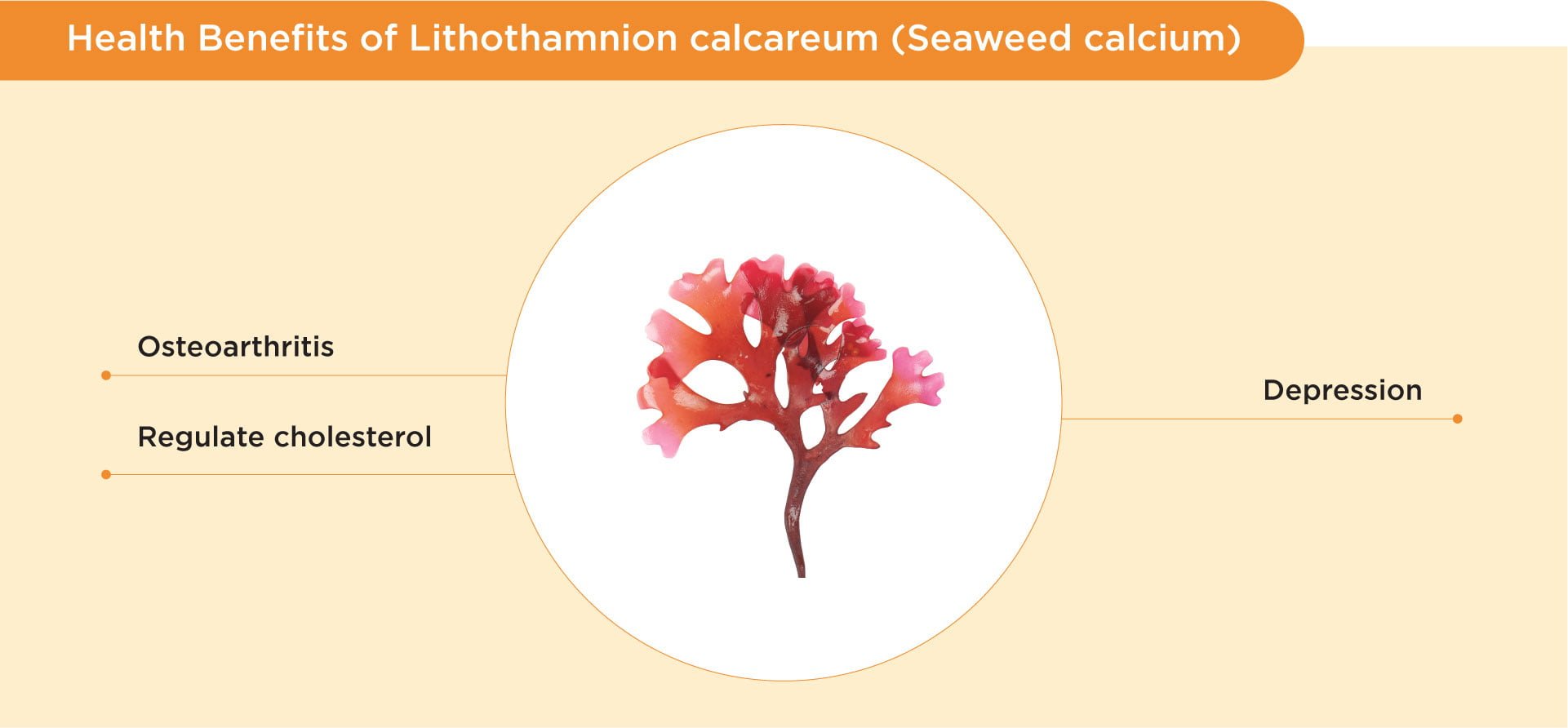Lithothamnium calcareum (Seaweed calcium)

Lithothamnium calcareum (Seaweed calcium)
Lithothamnion calcareum is a seaweed or red algae from the Corallinacea family. It is a typical calcareous algae, present with reddish colour. Its thallus is hard because of the crystallisation of calcium carbonate and magnesium in its cell wall 1. The calcium, aluminium, silicon, iron and titanium found in L. calcareum were significantly higher than the other red algae species, with calcium concentration constituting up to 31% of its weight 2,3. Calcium derived from seaweed is getting more popular in the market due to its bioavailability and beneficial effect on bone skeletal calcification 1.
Nutritional Facts
L. calcareum contains calcium carbonate, magnesium carbonate, iron, zinc, fluorine, manganese, cobalt, iodine, alginates and vitamin C. Calcium and magnesium in the form of carbonates are easily and highly absorbed, ensuring adequate bone mineralisation and restoring the acid-base balance in the body 4.
Published Health Benefits
1. Osteoarthritis
Dietary supplementation with Lithothamnion sp. has been found to confer anti-inflammatory properties, specifically in reducing the discomfort in knee osteoarthritis patient 5.
2. Regulate cholesterol
Research has found that lipid markers such as LDL and total cholesterol were lower in human subjects who consume Lithothamnion sp. daily 5. As the calcium found in the seaweed may bind to bile acid and cause depletion of bile acid. The restoration of bile acids from cholesterol thus helps lower LDL and total cholesterol levels 6.
3. Depression
Seaweed contains ample amounts of magnesium which is helpful in stabilizing the mood through its positive effects on the neurotransmitter involved in mood regulation 8. Regular consumption of seaweed can effectively reduce the depressive symptoms and decrease suicide risk in adults 7,8.
References:
1. Silva, P. D. R., Kawai, G. S. D., Andrade, F. R. D. D., Bezzon, V. D. N. & Ferraz, H. G. (2021). Characterisation and traceability of calcium carbonate from the seaweed Lithothamnium calcareum. Solids, 2: 192-211. https://doi.org/10.3390/ solids2020013
2. Desideri, D., Cantaluppi, C., Ceccotto, F., Meli, M. A., Roselli, C. & Feduzi, L. (2016). Essential and toxic elements in seaweeds for human consumption. Journal of Toxicology and Environmental Health, 79 (3): 112-122. https://doi.org/10.1080/15287394.2015.1113598
3. Xu, Y., Ye, J., Zhou, D. & Su, L. (2020). Research progress on applications of calcium derived from marine organisms. Scientific Reports, 10 (18425): 1-8. https://doi.org/10.1038/s41598-020-75575-8
4. Flammini, L., Martuzzi, F., Vivo, V., Ghirri, A., Salomi, E., Bignetti, E. & Barocelli, E. (2016). Hake fish bone as a calcium source for efficient bone mineralization. Int J Food Sci Nutr, 67 (3): 265-273. https://doi.org/10.3109/09637486.2016.1150434
5. Zhang, Y., Tian, R., Wu, H., Li, X., Li, S. & Bian, L. (2020). Evaluation of acute and sub-chronic toxicity of Lithothamnium sp. In mice and rats. Toxicology Reports, 7: 852-858. https://doi.org/10.1016/j.toxrep.2020.07.005
6. Cronin, B. E., Allsop, P. J., Slevin, M. M., Magee, P. J., Livingstone, M. B. E., Strain, J. J & McSorley, E. M. (2016). Effects of supplementation with a calcium-rich marine-derived multi-mineral supplement and short-chain fructo-oligosaccharides on serum lipids in postmenopausal women. British Journal of Nutrition, 115: 658-665. https://doi.org/10.1017/S0007114515004948
7. Miyake, Y., Tanaka, K., Okubo, H., Sasaki, S. & Arakawa, M. (2014). Seaweed consumption and prevalence of depressive symptoms during pregnancy in Japan: Baseline data from the Kyushu Okinawa Maternal and Child Health Study. BMC Pregnancy and Childbirth, 14 (301): 1-7. http://www.biomedcentral.com/1471-2393/14/301
8. Tarleton, E. K., Littenberg, B., MacLean, C. D., Kennedy, A. G., & Daley, C. (2017). Role of magnesium supplementation in the treatment of depression: A randomized clinical trial. PLoS ONE, 12(6), e0180067. https://doi.org/10.1371/journal.pone.0180067

